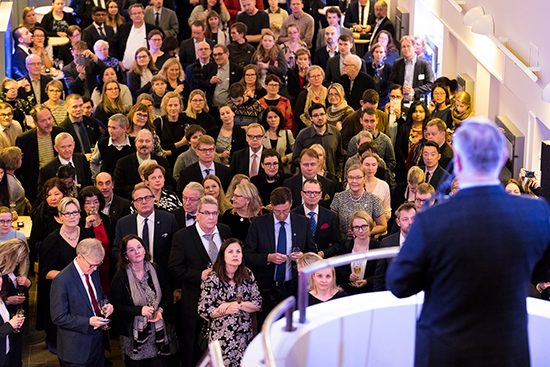International cooperation has been the cornerstone and the highlight of Esko Lotvonen’s career.
Born and raised in Rovaniemi, Mayor Esko Lotvonen has worked for the North all his life. He started his career in regional development in the early 1980`s in the State Provincial Office of Lapland and cooperation with Russia was a natural step. In 1991, he worked for the establishment of the Northern Forum in Anchorage, and he was involved in the preparations for the Barents Euro Arctic Council, founded in 1993. When Finland joined the European Union in 1995, Esko Lotvonen was instrumental in launching cross-border cooperation and funding programs.
”At the beginning of my career, the Cold War was still on, and international contacts were not many. Then in the 1990’s Barents and Arctic cooperation got under way. Once Finland joined the EU, cross-border cooperation became commonplace. Networks were established between educational institutions and businesses. We wanted to promote collaboration, do things together. In the new millennium, international cooperation has become business as usual.”
Esko Lotvonen was County Governor of Lapland in years 1995-2012. He cites an impressive list of defunct and still active organisations that he has been involved in founding or that he has chaired. His current passions include the network of World Winter Cities Association of Mayors ( Vice President) and the Arctic Mayors’ Forum.
”A major proportion of people living in the Arctic region live in cities. Arctic cities are pioneers in energy production, in circular economy and in the development of tourism. Policies are decided on higher levels, but here in the Arctic cities and in the northern regions we make the practical decisions that will affect climate change and the everyday lives of people.”
”I am pleased that the City of Rovaniemi has decided to be active in the Arctic cooperation. Through the Arctic Centre, we have first rate research. It was a memorable moment to have the Arctic Council Ministerial Meeting here in Rovaniemi in last May”, Esko Lotvonen says.
“In Lapland, our focus on Arctic affairs is clear. We are living in an Arctic laboratory, our relationship with the Arctic is fresh and real. I am proud of the fact that the Sami, the indigenous people living in Lapland are an essential part of Arctic cooperation.”

Photo Marko Junttila: Esko Lotvonen giving a welcome speech in the evening reception of the Rovaniemi Arctic Spirit conference 2017.
Esko Lotvonen has hosted many distinguished guests, from the political leaders of China to the President of India, from Secretary of State Mike Pompeo to Foreign Minister Sergey Lavrov. Everybody who is anybody, wants to come to Lapland.
“When I started my career in the 1980’s, Lapland was considered remote, cold, and expensive. Now the prices are no longer deemed too high, and we are no longer far away, because travelling is easier. Coldness too has become an asset, though unfortunately we have less of it because of the climate change.”
Esko Lotvonen has learned that it is possible to turn the tide, to change the course of development. He is delighted that his interests have become global interests. He is also proud of the networks he has created.
“I am no longer as eager to travel as I was before, but it is always a pleasure to see familiar faces, whether they come from Singapore, Norway or the U.S. The best part of Arctic conferences is meeting old friends and looking back to the things we have made possible together.”
The City of Rovaniemi is one of the organisers of the Rovaniemi Arctic Spirit conference. This year, the focus is on young people.
“In the Barents and North Calotte cooperation structures we have always wanted the young to have their say. It is important to hear the future generations in Arctic cooperation as well. That is why we want to give them a major role in the Arctic Spirit conference.“
Esko Lotvonen hopes that as he retires next summer, future generations will be able to reap the benefits of his work.
“I have been privileged to have been involved in things that have become major issues globally. As someone put it, the important thing is not your own harvest, but the seeds that you have sown.”
ArcticFinland.fi
Interview: Maija Myllylä
Photo: Heidi Volotinen